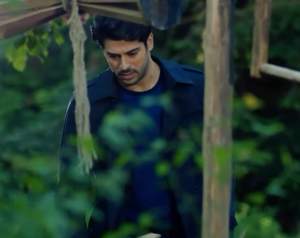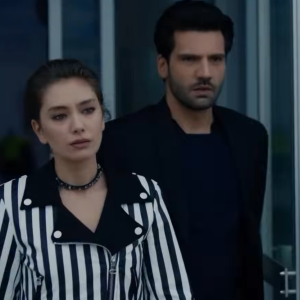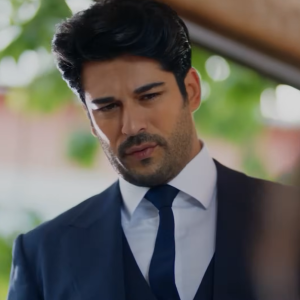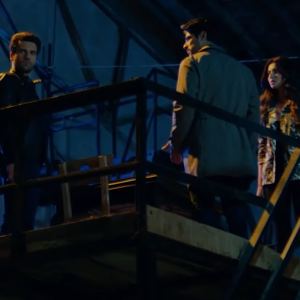In the world of television drama, few encounters deliver the intensity and psychological warfare quite like the explosive clash between Emir Kozcuoğlu and Kemal Soydere in Endless Love. This confrontation, stitched together through a labyrinth of deceit, shadowy phone calls, and haunting threats, propels the audience into a storm of suspense where truth becomes a lethal weapon. The episode begins with an almost tender whisper of love, a brief illusion of peace, before the storm of revelations crashes down. A mysterious phone call exposes hidden footage that threatens to unravel Emir’s darkest secrets—evidence that he orchestrated not just betrayal, but murder. Kemal, torn between desperation and determination, accepts the dangerous invitation to uncover the truth, even though he knows the price could be his life. From that moment forward, the episode transforms into a merciless race against time, with secrets surfacing like ghosts and alliances crumbling under the weight of blood-soaked truths.
As the scene shifts, the choreography of mistrust intensifies. Every line of dialogue carries the sharpness of a blade, and every glance hides a minefield of emotions. Kemal ventures into the shadows of an abandoned cable factory, a symbolic battleground where betrayal manifests in its most tangible form. Emir, ever the manipulator, uses loved ones as bargaining chips, proving that his cruelty knows no limits. “If you want him to live, follow my rules,” he warns, placing Nihan in the cruelest position imaginable—between her love for Kemal and her chains to Emir. The tension becomes unbearable when guns are drawn, accusations fly, and the factory transforms into a theater of survival. The sound of gunfire doesn’t merely echo through the room; it pierces the fragile web of trust and pushes the characters to a point of no return. Each moment bleeds with dramatic irony, as the audience realizes that every step forward is another descent into Emir’s carefully constructed hell.
The episode spirals further when Kemal and Emir’s battle shifts from physical dominance to psychological annihilation. Emir, reveling in his sadistic power, makes it clear that he is not merely a man fighting to protect his pride—he is a tyrant intoxicated by control. His threats to strip Nihan of her family, to destroy Kemal’s resolve, and to bury justice under his wealth and influence, demonstrate the chilling extent of his grip over everyone’s destiny. Meanwhile, Kemal’s defiance is as reckless as it is heroic; he refuses to cower, even as death hovers inches from his face. This refusal ignites a dangerous escalation, a verbal duel where words are as deadly as bullets. Emir pushes the boundaries of fear, simulating executions, only to laugh at the cruelty of sparing life as if it were his to grant. His game is no longer about protecting secrets—it is about proving that he is the executioner of hope itself, a force capable of turning every breath into borrowed time.
And yet, amid the chaos, the emotional core of the story refuses to fade. Nihan, the woman caught between two worlds, becomes the human embodiment of tragedy. Her anguish pours out in every scene—her loyalty to her brother, her suffocating fear of Emir, and her relentless yet forbidden love for Kemal. She becomes the unwilling currency in this war, forced to navigate a nightmare where silence can mean survival and words can spark disaster. Her confrontation with Emir strips away her resilience, exposing a woman who has carried too many secrets and too much guilt. Emir feeds off this vulnerability, twisting the knife deeper by reminding her of Ozan, of the blood already spilled, and of the chains he holds around her neck. In contrast, Kemal’s presence is both salvation and torment for Nihan. His determination to protect her, even against impossible odds, transforms every stolen glance and whispered plea into a silent rebellion against Emir’s reign of terror. It is here, in these emotional fractures, that the episode transcends being a simple thriller and becomes a tragic symphony of love, betrayal, and survival.
The climax of the episode leaves the viewer breathless, with no promise of resolution but every assurance of deeper wounds to come. The standoff outside the police station becomes a grotesque performance of power, where Emir flaunts his ability to kill Kemal at will, even under the watchful eyes of authority. The line between law and crime blurs completely, proving that Emir’s reach extends far beyond bullets and blood—it seeps into the very fabric of justice itself. Kemal, however, does not falter. His vow to bring Emir down reverberates like a battle cry, promising that this war is far from over. The episode closes with an unshakable tension, as though the audience has been forced to inhale but forbidden to exhale. Emir and Kemal do not simply face off in this chapter of Endless Love; they tear open the boundaries between love and hate, loyalty and betrayal, justice and corruption. What remains is the terrifying certainty that every character has already lost something irreplaceable, and that the war for what little remains has only just begun.





